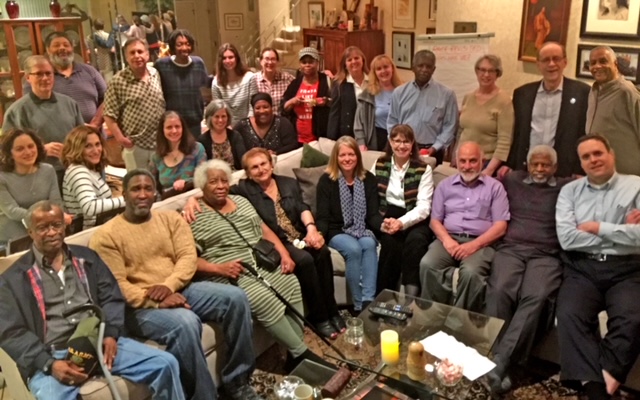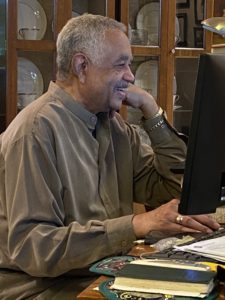



By Christopher Carpenter
When Van Gilmer, an African American Baha’i living in Wilmette, Illinois, began a small devotional gathering in his living room some nine years ago, he had no way of knowing that it would evolve into an online meeting in which Black and white participants share very personal stories of the ways racism has affected their lives.
One African American shared her experience of having white children refuse to play with her until she showed them whether or not she had a tail. A white man shared his experience of being beat up because he ate at the same table with Black friends when he was enrolled in the military.
Stories like these go to the heart and reflect the lowering of barriers that Gilmer hopes take place in the meetings, which he calls An Intimate Dialogue on Race. Each meeting begins with readings from a variety of religions, which gives everyone a chance to focus and helps establish common ground for the Black, white, Jewish, Christian, and Baha’i participants.
A gathering that developed in stages

In the meeting’s earliest days, friends numbering in the single digits met at Gilmer’s house to read prayers and share music together; Gilmer is the director of music for the Baha’i House of Worship in Wilmette. Over time, the discussion of social issues became a regular part of the evening and attendance began to rise.
In 2019, he began following the prayers and readings with discussions on race, and 25 to 30 people started attending regularly. Gilmer would introduce a topic, and those in the room would have a chance to offer their views if they wished. Conversations continued late into the evening as friends partook of refreshments and connected on a more personal level.
Gilmer says he patterned the meetings like a Baha’i Feast, beginning with prayers and readings, followed by deep discussion, followed by a more informal social time.
The gatherings moved online when the pandemic arrived, and each monthly meeting now attracts 150 to 200 people. While allowing for many from outside Chicago’s North Shore suburbs to participate, the Zoom gatherings also have helped Gilmer maintain and strengthen his local ties with people who are working to achieve racial unity and justice.
Questions as a basis for meaningful conversation
An Intimate Dialogue on Race focuses on race as it relates to African American descendants of enslaved people. To get discussions started, Black and white participants who are invited beforehand answer questions about the ways race has been a factor in their lives.
These questions are evolving with experience, and touch on the cultural context of people’s upbringing and current family situation, and moments of sometimes-traumatic realization about race in America. Black participants are asked to share experiences with white people that have affected them deeply, and white participants are asked to share an action that has helped them on their journey away from racism.
Gilmer says this format opens the door to difficult topics. “Both Black and white people have a hard time answering the questions,” Gilmer says, “because [racism] goes deeply to our core, to things we don’t want to think about, let alone tell.”
Several groups are exploring the Intimate Dialogue model as a basis for conversations on race in their own communities. Junia Hedberg, a member of the anti-racism team at the predominantly white First Congregational Church in Wilmette, met Gilmer through a multifaith alliance and began attending Intimate Dialogue after he extended an invitation to that group.
Her church has a relationship with a predominantly Black church in Chicago’s southern suburbs, and the two congregations are exploring the possibility of deepening their relationship using questions from Intimate Dialogue.
“We want to start dialogues,” Hedberg says, “and I think the way [Gilmer] has done it is a fabulous way.”
Cynthia Barnes Slater, an African American Baha’i whom Gilmer invited to answer a set of questions for one of the gatherings, sees real value in going beyond superficial conversations about race.
“People can be very patronizing,” Barnes Slater says. “Maybe that’s not their intention, but that’s the way it comes across. ‘I don’t see race. We’re all one people.’ That’s the kind of thing that comes up in communities.
“But these intimate dialogues help break down that superficial reality and that patronizing way of communicating so that we can communicate more honestly with each other.”
Gilmer encourages all participants to share from their genuine experiences rather than what they think others want to hear. He draws inspiration from recent Baha’i guidance addressing race relations in the United States. One letter from the global governing council of the Baha’i Faith refers to “enkindled souls” who share the divine love that offers healing from racism “through intimate conversations that create new susceptibilities in human hearts, open minds to moral persuasion, and loosen the hold of biased norms and social systems so that they can gradually take on a new form in keeping with the requirements of humanity’s age of maturity.”
Engaging the wider community
While many participants are Baha’is, an equal, if not greater, number come from the wider community. Intimate Dialogue has attracted participants from other North Shore organizations that are seeking to eradicate racism. Gilmer and other local Baha’is have been involved in most of those organizations. The program has also attracted members of a local Rotary Club and at least one member of a North Shore village board.
Gilmer says the discussions can help these friends better understand the basis for the Bahá’í teachings on racial equality and the oneness of humanity. “Everybody knows that I am a Baha’i,” Gilmer says, “and I try to make it more and more clear.”
In November 2021, several Intimate Dialogue participants attended a showing of the film Exemplar at the nearby Baha’i House of Worship. Parts of the film focus on the life of ‘Abdu’l-Baha, the son of Baha’u’llah, Founder of the Baha’i Faith, and His exhortations to the Baha’is to be leaders in creating racial unity.
Barnes Slater sees the dialogues as a chance to connect with like-minded people who share a belief in freedom from prejudice.
“This has given [Gilmer] an opportunity to extend the teachings of Baha’u’llah to people who might not otherwise be interested because of this principle we have: an elimination of racial prejudice,” she says. “It’s a way to attract people who may never become Baha’i, but they’ll always be friends of the Faith.”
David Schaen, another North Shore resident, sees the program as a step forward in what often seems like very slow progress toward American society freeing itself of deeply ingrained prejudice.
“It’s a bit overwhelming at times,” he says. “I’ve experienced feelings of helplessness and ‘Wow, this is bigger than just me,’ and ‘What can I really do individually?’
“But it’s also hopeful at the same time that maybe things can get better. Maybe relations can improve. I honestly feel that [Intimate Dialogue] goes a long way towards that.”


![]()
![]()
Whether you are exploring the Bahá'í Faith or looking to become an active member, there are various ways you can connect with our community.
Please ensure that all the Required Fields* are completed before submitting.